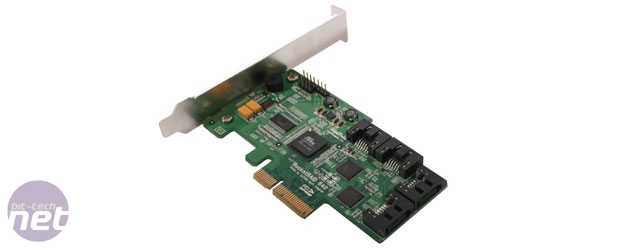
Performance Analysis
We soon managed to hit the Rocket 620's performance ceiling with two Crucial C300 SSDs attached to it in JBOD configuration. In AS SSD, the maximum combined sequential read speed of the two drives was 439MB/sec; only 94MB/sec higher than a single drive. Two-drive JBOD write-speed scaling was also poor, with a single C300 256MB managing 217MB/sec, and two of them in JBOD configuration totalling 317MB/sec. As this is notably below what we can assume is the bandwidth cap of 440MB/sec, the Marvell 9128 SATA 6Gbps controller chip must be at fault when handling the heavy write commands of both drives simultaneously.Random performance also seems to cap-out on the Rocket 620, with 64-thread 4k random reads rising only 25MB/sec in a two-disk JBOD configuration, in comparison to a single disk and 64-thread 4k random writes rising only 30MB/sec.
The RocketRAID 640, with its pair of Marvel 9128 controllers, certainly fixes a lot of these performance bottlenecks. We connected our two drives to the two separate banks of SATA 6Gbps ports, in order to give each drive its own SATA 6Gbps controller chip. In JBOD configuration, sequential read speeds were epic, peaking with combined read speeds of 653MB/sec and write speeds of 404MB/sec. It’s not double the speed of a single drive on the Rocket 620, but it’s not too far off.
Enabling RAID0 saw these speeds dip a little, though, with our C300 256GB RAID0 array managing a sequential read speed of 615MB/sec, and a sequential write speed of 379MB/sec.
Click to enlarge
Random performance was similarly improved in comparison to the 620. In both JBOD and RAID0 configuration, the RocketRAID 640 managed random read speeds of 326-330MB/sec when conducting 64-thread 4k random read tests, and 236-239MB/sec during 64-thread random write tests.
Finally, we tried RAID0 with three C300 256GB SSDs and were pretty disappointed by the results. It seems that the Marvel 9128 SATA 6Gbps controllers cap-out very quickly when adding two drives to the same pair of ports, and the addition of a third drive saw only a small performance increase, and in some cases a slight drop. Sequential read speeds were only 572MB/sec, while sequential write speeds jumped a little to 384MB/sec, although this is still slower than two-disk JBOD.
Random performance again saw the three-drive RAID array producing a minimal improvement, managing a 25MB/sec increase over two-disk JBOD setup when dealing with 64-thread 4k random reads. Meanwhile, the 64-thread 4k random write speeds improved by a similar amount, peaking at 355MB/sec.
While running two drives, each with its own Marvel 9128 drive controller, saw the level of performance for which we were hoping, adding a second drive to either of the Marvel 9128 controllers on the RocketRAID 640 resulted in poor performance. What's more, in three-disk RAID0 configuration, the improvements were negligible. We also tried a two-disk JBOD configuration with both drives plugged into the same pair of ports and the performance was dire. In this setup, the combined read speeds were below 180MB/sec, so we simply ruled this out as a faulty setting.
We also performed some real world tests in the form of a Windows 7 reboot and loading a level in STALKER: Call of Pripyat. These tests were more for reference, though. As we expected, the RAID0 setups had minimal impact on reboot times and zero influence on the speed of game loads when compared with a single Crucial C300 256GB.

MSI MPG Velox 100R Chassis Review
October 14 2021 | 15:04









Want to comment? Please log in.